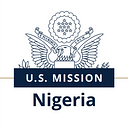Binta Yahaya Benefits from Improved Maize Seed Varieties and other Farm Inputs
Binta Yahaya, a mother of four, is a maize smallholder farmer from Kaduna State. She has been growing maize for over 25 years using traditional farming methods. For several years, Binta and her neighbors complained that farming was not profitable. They also bought farm inputs such as maize seeds from the open market that were of low quality.
She heard about the positive reviews of the Value Kit in her community and decided to give it a try. She participated in the Kaduna State Consortium project with the support of the Partnership for Inclusive Agricultural Transformation (PIATA), a strategic partnership between the Alliance for a Green Revolution in Africa, USAID’s Feed the Future Initiative, the Bill & Melinda Gates Foundation, The Rockefeller Foundation, and the UK Department for International Development.
The five-year PIATA activity seeks to increase and sustain an inclusive agricultural transformation in at least 11 countries, including Nigeria, across multiple regions in Africa, with a goal of increasing incomes and improving the food security of 30 million smallholder farm households. USAID, through efforts like Feed the Future, have already taken action to protect nutrition and prevent more children and their caregivers from falling further into malnutrition.
Binta, like other women in her community, received from PIATA a free Value Kit — a complete farm input for maize production — that comes with composite maize inputs such as seeds, fertilizer, and crop protection. With the help of the Value kit, she practiced the new farming technique as advised by the extension service providers during planting season.
At harvest, Binta was surprised by her results. She harvested 5.6 metric tonnes of maize compared to the usual 2.5 metric tonnes on her 1hectare farm. Having practiced both traditional and modern farming methods, she is now on the frontline telling other female farmers in her community of the benefits of modern farming using improved seeds from the Value Kit.
“Before I got the Value Kit, farming was not profitable,” said Binta, “but now, with the improved seeds, I had a bumper harvest and took my surplus yield to the market. Now I can pay my children’s school fees, pay for medicines, when necessary, and expand my farming business in the next growing season.”
Through PIATA, USAID is addressing challenges related to seed systems development; support to the Nigerian government to address low productivity of smallholder farmers through access to quality inputs, extension services and access to markets; and capacity strengthening of national and state governments for planning, budgeting, and coordination and accountability.
The U.S. government’s Feed the Future initiative has helped millions of families around the world lift themselves out of hunger, poverty, and malnutrition.
#EndHunger #WorldFoodDay
